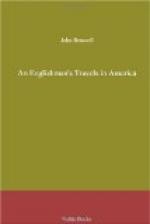CHAPTER VII.
“Woe worth the hour when it is crime
To plead the poor dumb bondman’s
cause,
When all that makes the heart sublime,
The glorious throbs that conquer time,
Are traitors to our cruel
laws.”—LOWELL
The general appearance of the majority of the coloured people in the streets of Charleston denoted abject fear and timidity, some of them as I passed looking with servile dread at me (as they did at almost every one who happened to pass), so that I could read in many of their looks a suspicion of interference, which, commiserating their condition as I did, was quite distressing.
It is impossible to form a correct estimate of what the perpetuators of slavery have to expect, if once the coloured population obtain a dominant position. The acknowledged gradual depopulation of the whites in the slave states, through sickness, exhaustion of the land, and consequent emigration, united with other causes, there is no doubt will eventually result in a great preponderance of coloured people, who, aroused by the iniquitous treatment they undergo, will rise under some resolute leader, and redress their wrongs. I was quite struck to see in Charleston such a disproportion of the colours, and, without exaggerating, I can say, that almost if not quite three-fourths of those I met in the streets were, if not actually of the negro race, tinged in a greater or less degree with the hue.
Pursuing my perambulations, I came to the slave and general cotton place of vendue, to the left of the General Post-office, which building is a very substantial edifice of stone. Here a dozen or twenty auctioneers were loudly holding forth to the assembled crowds, and cracking up their wares in New York style. The most indescribable scene of bustle and confusion prevailed, the whole street being covered with open bales and boxes of goods. In one part of the street was a slave warehouse, and advertisements were placarded outside of the particulars of the various lots to be offered for competition, and now on view. As the privilege of viewing in this instance was confined to those who possessed tickets, I did not apply for one, as I knew that the wish would be attributed to curiosity, and possibly a worse construction be put upon it, through my being a stranger in the place.
Passing onwards through the assembled throng, I got into a more secluded part of the city, and came upon a large burial-ground, in which many of the monuments erected to the memory of the dead were of a very expensive description. One in particular attracted my notice; this, on inquiry of a gentlemanly-looking man, who, like myself, was inclined to “meditate among the tombs,” I ascertained had been erected by the relatives of a planter, who had resided in an adjoining state, but who had several cotton plantations within ten miles of Charleston; these he occasionally




